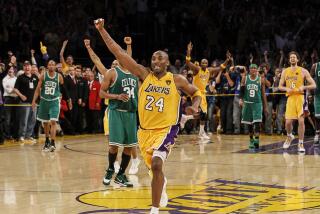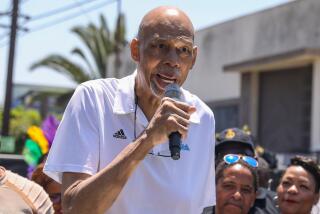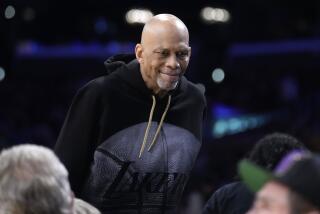Commentary : Exceptions to Kareem’s Happy Ending
LANDOVER,Md. — The gold-watch tour continues.
Kareem Abdul-Jabbar steps to the center of yet another court, somebody gives him a gift, somebody else gives a speech, the fans stand and shout and scream. As the ritual plays out, Kareem says goodbye while trying to sound sincere and then plays basketball while trying not to embarrass himself.
Some nights, it works out better than others.
Kareem Abdul-Jabbar has stayed a season too long, and yet, strangely, he hasn’t overstayed his welcome. In fact, only now that he’s retiring, at age 41, has he become welcome at all.
A season ago, though his skills were in decline, he still mattered on a championship team. And there were moments -- if scattered, still shining moments nonetheless -- that evoked the Kareem of the ages, the once-thought ageless Kareem. That would have been a fitting ending.
Today, he casts no shadow. He is a walking, talking memory, a tribute to what was. And so, they cheer for him, and for what was, even though these same people had booed him for two decades and more. They give him a gift, a jukebox here, a motorcycle somewhere else, and he says thanks.
He likes the cheers. He liked them again Sunday night when, in his ninth farewell address of the season, Abdul-Jabbar acknowledged the standing ovation and the obvious affection shown by the sellout crowd at Capital Centre. He thanked people for no longer thinking of him as, in his words, a villain.
And he must sense that it could have always been this way. That if only he’d been more gracious. That if only he’d been less reclusive. That if only in his youth he had learned maturity and wisdom. If only.
But, I wonder if any of it would have made a difference.
He was born to be a villain from the moment he pulled on a pair of short pants. It wasn’t that he was protected from the media glare by his high school coach or his college coach. It wasn’t because he was determined not to be freak. And it wasn’t because he didn’t know whom to trust, so he decided to trust almost no one. It wasn’t even that he became a Moslem and changed his name (although none of that helped).
He was 7 feet, 2 inches tall, and as another 7-footer, Wilt Chamberlain, once said, “Nobody loves Goliath.”
Nobody loved Wilt or Bill Walton or Patrick Ewing or Ralph Sampson or Moses Malone. Only Bill Russell escaped, and only because he was paired forever with Chamberlain, the eternal villain.
It didn’t matter that Chamberlain was (is) a fun person to be around, a bright guy you’d love to have dinner with. Or that Russell was (is) often surly, unfriendly, ungracious. He could beat Wilt and a nation loved him for that.
Not only was Abdul-Jabbar a giant, he was graceful beyond any known standard, and it didn’t seem fair. They changed the rules because of him, taking the dunk shot from the college and high school games. He was, most of all, like Wilt before him, an aberration, a freak. You don’t love freaks.
But then, over time, over decades, it all changed. His house burned down, he lost his hair, he wrote a book and he got old. Suddenly, he was vulnerable, and he saw that if he reached out even a little, people were prepared to reach back. That’s how happy endings are made.
“I’m really pleased people are taking the time and showing the effort,” Abdul-Jabbar said Saturday in an pre-farewell meeting with the press. “I’ve had to be the villain everywhere we’ve played because of the success of the Lakers. This is nice.”
It wasn’t because of the success of the Los Angeles Lakers, of course (see: Magic Johnson ). And the Lakers were not successful Sunday night. Despite a quick start, neither was Abdul-Jabbar, who scored 16 points (tying a season high), but none of them when it counted.
Early, he showed us flashes, a left-handed hook, a right-handed hook, even a rebound or two for a man whose feet sometimes seem nailed to the floor. In the fourth quarter, the Lakers were attempting to play from memory. Twice, down the stretch, they went to Abdul-Jabbar, who went to the skyhook, a shot that defined a basketball generation. In each case, the ball bounced harmless off the rim.
At the very end, with two minutes to play, Abdul-Jabbar returned to the game. But, he was only another player on the floor. And even though that meant a great victory for the Washington Bullets in a season in which any victory, big or small, is a victory worth remembering, it wasn’t the way I’d like to remember Abdul-Jabbar.
More to Read
Go beyond the scoreboard
Get the latest on L.A.'s teams in the daily Sports Report newsletter.
You may occasionally receive promotional content from the Los Angeles Times.










